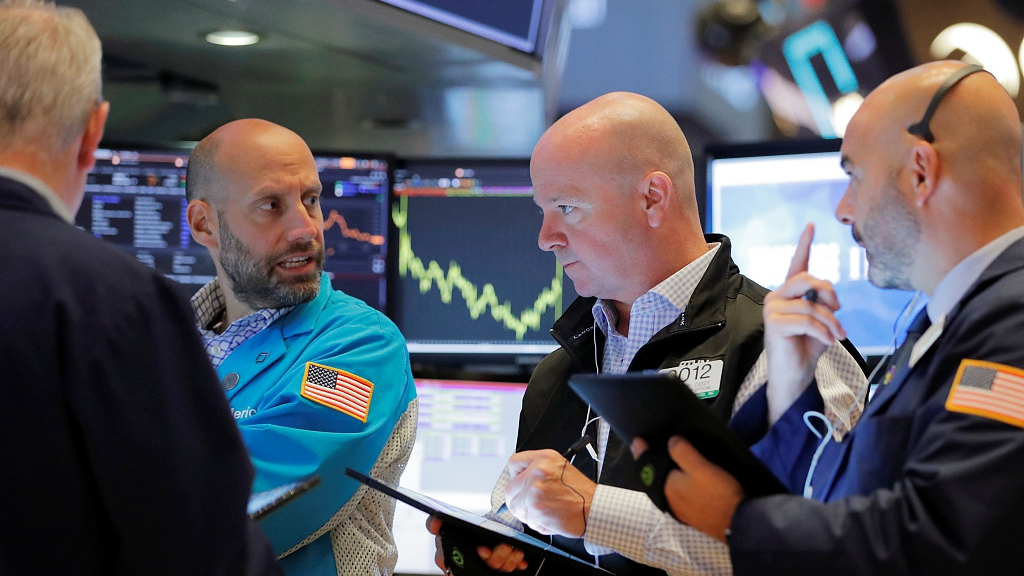

Editor's Note: Tom Fowdy is a British political and international relations analyst and a graduate of Durham and Oxford universities. He writes on topics pertaining to China, the DPRK, Britain and the United States. The article reflects the author's opinions, and not necessarily the views of CGTN.
Economic growth in the United States slowed to 2.1 percent in the second quarter of 2019, a drop from the 3.1 percent in the previous installment. The slowdown coincided with a drop in American exports, a 2.2 percent decline in manufacturing, and a fall in business investment by 0.6 percent. Economists at the U.S. Federal Reserve and others had anticipated a weakening in growth owing to the accumulative impact of Trump’s trade war escalation with China.
In addition, newly released figures also revised down U.S. GDP growth for the year of 2018, outlining that the economy only grew 2.5 percent, thus cutting down the White House's celebrated goal of three percent. Despite the below par numbers, President Donald Trump claimed that the current economy is "the best in America's history," blaming the U.S. Federal Reserve for the outcome and then reiterating "The U.S is set to zoom!" However, it is time that the president and his supporters take a serious look at the impact of their policies. Unquestionably, the trade war and the fallout of the broader atmosphere of vilification against China are now hurting the U.S., extending beyond the issue of trade. Talk of tariffs bringing back jobs and manufacturing in the U.S. has simply not materialized. Thus, if the president is sincere in how much importance he places on the economy; with the 2020 election in view he must be prepared to make a deal with Beijing, something which will win the confidence of markets, businesses and voters.
The Trump administration has long insisted that it can pursue and win a trade war against China without any serious damage to the economy. While the extent the president actually believes this is uncertain, he has nevertheless made a number of promises from the conflict that he can bring back American jobs and manufacturing from China by weaponizing tariffs and pushing Beijing to accept more favorable terms from the United States. Either way, good GDP numbers in the first quarter gave Trump confidence that America was not being hurt, thus giving him confidence that he could escalate the trade war and get away with it.
Now however, the aggregated impact of it all is showing. Although Trump blames Federal Reserve policies for the poor performance, there is direct evidence that the trade standoff, as well as the broader hostility towards China perpetuated in Washington, is responsible.

People shop along Broadway in lower Manhattan in New York City on May 30, 2019. /VCG Photo
First of all, Market Watch notes that American exports fell 2.7 percent in June. Which area of exports fell most drastically? The report highlights "food and livestock," which is of course a direct product of the trade war. In addition, it also notes that America's trade deficit as a whole will grow in 2019 (contradicting Trump's claim that American jobs and manufacturing are coming back).
But it doesn't end there; business investment in the United States was also down 0.6 percent. Why might that be? Federal Reserve Chairman Jerome Powell (a frequent target of Trump's attacks) stated that the stagnation is a result of declining business confidence, which he states "reflects concerns about trade tensions and slower growth in the global economy." Again the trade war is the root cause. The Trump administration's policies are creating a poor, uncertain and unstable atmosphere for businesses, therefore plugging investment.
There are other noteworthy mentions too; a Rhodium Group report found that Chinese FDI into the United States has declined 90 percent since Trump took office, dropping from 46.5 billion U.S. dollars to 5.4 billion U.S. dollars. In addition, Chinese tourism to the United States has also dropped by 5.8 percent, with locations such as Hawaii even recording a 36 percent loss. This of course is not just the trade war, but the wider climate of suspicion, hysteria and aggression towards Beijing is creating a poisonous atmosphere which is deterring Chinese from investing and involving themselves with the country.
Given this, with solid evidence that Washington's policies towards Beijing are now hurting the United States and contributing to an economic slowdown, the Trump administration needs to think carefully as to whether it is serious about clinching a deal with Beijing in the coming months. The president attaches a great deal of significance to his economic record. While he is prone to constantly exaggerate it, he can scarcely hide it if the numbers are insufficient.
If, however, he does decide to reach an agreement with China, he can claim not only a political victory for himself, but also win the confidence of markets, businesses and voters. The choice is his.
(If you want to contribute and have specific expertise, please contact us at opinions@cgtn.com.)

Copyright © 2018 CGTN. Beijing ICP prepared NO.16065310-3
Copyright © 2018 CGTN. Beijing ICP prepared NO.16065310-3